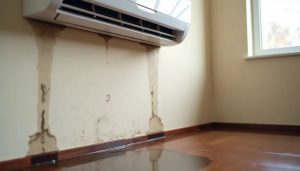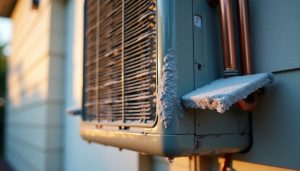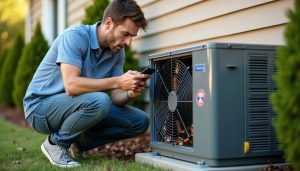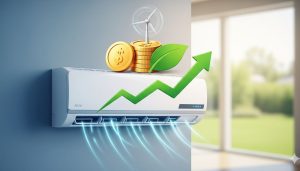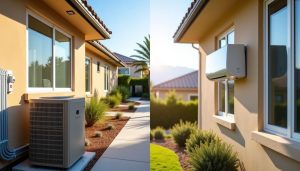Your AC just stopped working. The temperature outside is climbing toward 100°F, and your house is getting hotter by the hour.
Emergency AC repair in Chino Hills isn’t just about staying comfortable—it’s about keeping your family safe. When outdoor temperatures hit 90°F or higher, a broken air conditioner becomes a genuine emergency. Even 80°F indoors can be dangerous for young children, elderly family members, anyone with chronic health conditions, and your pets.
Here’s what makes an AC breakdown urgent:
A sudden system shutdown that leaves you with no cooling. Warm air blowing from your vents instead of cold. Water pooling around your indoor unit. These aren’t minor inconveniences—they’re warning signs that demand immediate attention.
Without working air conditioning, prolonged heat exposure can quickly lead to heat exhaustion or heat stroke, especially for vulnerable family members.
Ready to get your cooling back fast? We’ll show you exactly what to do when your AC fails and how to keep everyone safe while help is on the way. You’ll learn quick troubleshooting steps that often solve the problem immediately, plus temporary cooling strategies that actually work.
Common Causes Behind Sudden AC Failures
Knowing why air conditioners fail helps you spot problems early and avoid emergency breakdowns. These are the most frequent culprits behind unexpected AC shutdowns in Chino Hills homes.
Mechanical failures and worn-out parts
Your AC system relies on motors, belts, fans, and compressors working together seamlessly. Without regular lubrication and inspection, these moving parts create excess friction that leads to premature wear or complete failure. A single snapped belt stops your entire system. Loose electrical connections create malfunctions and safety hazards.
Summer puts maximum stress on compressors, especially during Chino Hills’ intense heat and humidity. When compressors overheat or seize up, your whole system shuts down.
Thermostat or sensor malfunctions
Think of your thermostat as mission control for your HVAC system. When it fails, your AC won’t turn on, can’t maintain the right temperature, or starts short cycling. You’ll notice incorrect temperature readings, blank screens, or controls that don’t respond.
Misaligned or damaged sensors cause your system to misread room temperatures, triggering those frustrating on-off cycles that waste energy and stress your equipment.
Clogged filters and blocked airflow
Dirty air filters rank among the most common yet preventable causes of AC failure. Clogged filters force your system to work harder while reducing efficiency by up to 15%. This extra strain wears down components and can trigger overheating.
The U.S. Department of Energy reports that clogged filters increase energy consumption by approximately 15%, driving up your utility bills while shortening your system’s lifespan.
Refrigerant leaks and low cooling output
Refrigerant absorbs heat from your indoor air and releases it outside—no refrigerant means no cooling. Leaks often go undetected without professional inspection, but the signs are clear: weak airflow, warm air from vents, or hissing sounds from your system.
Low refrigerant forces your compressor to work overtime, often leading to expensive compressor failure. You might see ice forming on coils or your outdoor unit.
Poor installation or skipped maintenance
Poor installation increases your heating and cooling energy use by approximately 30%. Common problems include leaky ducts, incorrect refrigerant levels, oversized systems, and restricted airflow that prevent proper operation.
Regular maintenance prevents these issues and keeps your system running efficiently when you need it most during summer’s peak heat.
What to Do When Your AC Stops Working
When your air conditioning system suddenly fails, the right first steps can save you time, money, and stress. Simple troubleshooting often solves the problem immediately—or prevents costly damage while you wait for professional help.
Stay calm and look for obvious problems
Take a deep breath and examine what’s actually happening with your system. Water pooling around your indoor unit? Strange grinding or squealing noises? Fan running but no cold air?
Note these details—they help our technicians diagnose problems faster when we arrive.
Check your thermostat first
Most “AC emergencies” start here. Verify your thermostat is set to “cool” mode (not “heat” or “fan”) and that the temperature is set below your current room temperature.
Battery-powered thermostat showing a blank screen? Replace the batteries—this simple fix solves the problem more often than you’d expect. Also check for loose wiring connections or corrosion around the thermostat, but turn off power at your circuit breaker first for safety.
Reset your circuit breaker
Head to your electrical panel—usually in the garage, basement, or utility room. Look for the circuit labeled for your AC unit, typically a double-switch marked “AC” or “HVAC”.
If the switch looks slightly out of alignment with the others, it’s tripped. Push it firmly to “off,” then back to “on”. The breaker trips again immediately? Stop there. This signals a serious electrical issue that needs professional attention.
Turn everything off if you smell burning
Detect any burning odor from your vents or AC unit? Shut off your system right away. Burning smells indicate electrical problems that can become fire hazards.
Don’t attempt any more troubleshooting. Contact us immediately for emergency service rather than risking your safety. These situations require expert intervention to prevent further damage and ensure your family’s safety.
Stay Cool While Help Is On The Way
Your AC is down and the heat is building. Don’t wait—take action now to keep your family comfortable and safe until professional repair arrives.
Smart Fan Placement Makes All the Difference
Position fans throughout your home to circulate air and create cooling breezes. Place a bowl of ice in front of a non-oscillating fan—the melting ice will help the fan distribute cooler air. Set ceiling fans to rotate counterclockwise for a cooling downdraft. Open windows on opposite sides of your home during cooler evening hours to create cross-ventilation that pushes warm air out.
Block the Heat Before It Gets In
Close curtains, blinds, or shades on south and west-facing windows where the sun hits hardest. This simple step drops indoor temperatures significantly by blocking the sun’s rays. Add temporary shading to any windows that don’t have blinds.
Keep Your Body Cool from the Inside
Drink water regularly—enough so your urine stays pale straw-colored. Avoid physical activities between 11am-3pm when temperatures peak. Schedule any necessary exercise for cooler morning or evening hours. Wear loose, lightweight cotton clothing to help your body regulate temperature effectively.
Protect Vulnerable Family Members
Elderly individuals, young children, pregnant women, and those with chronic medical conditions face serious risks from excessive heat. Move vulnerable household members immediately to air-conditioned environments like shopping malls, libraries, or community centers. Watch them closely for signs of heat-related illness.
Stop Adding Heat to Your Home
Heat-generating appliances make indoor temperatures climb fast. Skip using your oven, dishwasher, and dryer until repairs are complete. Choose microwave meals, salads, or outdoor grilling instead. Turn off unnecessary lights and electrical devices since they generate additional heat.
Stop AC Emergencies Before They Start
Simple maintenance steps throughout the year prevent costly breakdowns when you need cooling most. These proven strategies keep your system running reliably all season long.
Get professional tune-ups every spring
Professional maintenance prevents most sudden AC failures. Spring tune-ups let technicians clean coils, check refrigerant levels, lubricate moving parts, and tighten electrical connections before summer heat arrives. This proactive care catches minor problems before they become expensive emergencies.
Change your air filter regularly
Dirty filters restrict airflow, forcing your AC to work harder and waste 5-15% more energy. Replace filters based on your home’s needs:
- Homes with pets: Every 60 days
- Multiple pets or allergies: Every 20-45 days
- Standard homes: Every 90 days
Keep your outdoor unit clear
Maintain at least 18 inches of clear space around your outdoor unit. Remove leaves, branches, and debris after storms. Rinse the unit monthly to clear away dirt that blocks efficient heat transfer.
Create a heat emergency plan that works
Prepare for AC failures before they happen. Install window reflectors, seal gaps around doors and windows, and consider a backup generator. Keep portable fans on each floor ready to circulate air during emergencies.
Choose your HVAC company now
Don’t wait for an emergency to find reliable service. Establish a relationship with a trusted HVAC contractor who offers maintenance plans and priority service during peak summer months.
Ready to protect your family from AC emergencies? Contact us today for a free, no-obligation estimate. We’ll ensure your system is prepared for Chino Hills’ demanding summer heat.
Stay Cool, Stay Safe with Professional AC Service
We do the job right the first time, every time.
When your AC fails during Chino Hills’ intense summer heat, quick action protects your family’s health and safety. Know the warning signs. Follow the troubleshooting steps. Keep everyone cool until help arrives.
Regular maintenance prevents most emergencies before they happen. Annual tune-ups, clean filters, and clear outdoor units extend your system’s life while avoiding costly breakdowns during peak season.
Experience fast, reliable emergency AC repair tailored to Chino Hills homes.
Our expert team delivers prompt emergency AC repair service when you need it most. We understand the unique climate challenges of our community and respond quickly to restore your home’s comfort and safety.
Don’t wait until temperatures become dangerous. Contact RC Air Conditioning today for immediate assistance or to schedule preventive maintenance that keeps your system running smoothly all summer long.
Ready to ensure your family stays comfortable? Call us now for expert service you can trust.
Key Takeaways
When your AC fails in extreme heat, it’s not just uncomfortable—it’s a health emergency that requires immediate action and smart temporary solutions.
• Check basics first: Verify thermostat settings, replace batteries, and reset circuit breakers before calling for help—these simple steps solve many “emergencies”
• Stay safe while waiting: Use fans with ice, close blinds, drink plenty of water, and move vulnerable family members to air-conditioned locations
• Turn off immediately if you smell burning: Electrical odors indicate fire hazards that require professional attention, not DIY troubleshooting
• Prevent future breakdowns: Schedule annual tune-ups, replace filters every 1-3 months, and keep outdoor units clear of debris
• Have an emergency plan ready: Know your HVAC contractor’s contact info and prepare backup cooling strategies before peak summer heat arrives
Regular maintenance is your best defense against costly emergency repairs—a small investment in prevention saves thousands in emergency service calls and protects your family’s health during dangerous heat waves.
FAQs
Q1. What situations are considered AC emergencies? An AC breakdown is considered an emergency when outdoor temperatures exceed 90°F or if anyone in your home has chronic health issues that make them more susceptible to heat-related illnesses. This includes individuals with heart disease, poor circulation, or those taking certain medications.
Q2. Who should I contact if my AC stops working? If basic troubleshooting steps like checking thermostat settings and resetting circuit breakers don’t resolve the issue, it’s time to call a professional HVAC contractor. They can diagnose and fix more complex problems that DIY methods can’t address.
Q3. How can I stay cool while waiting for AC repairs? Use fans strategically, place ice in front of them for cooler air, close blinds to block heat, stay hydrated, and avoid using heat-generating appliances. If possible, move vulnerable family members to air-conditioned locations like shopping malls or libraries.
Q4. What immediate steps should I take if my AC breaks down? First, stay calm and assess the situation. Check thermostat settings and batteries, inspect the circuit breaker, and reset if needed. If you smell burning, turn off the system immediately and contact a professional. Avoid further DIY attempts if these steps don’t work.
Q5. How can I prevent future AC emergencies? Schedule regular AC tune-ups, replace filters every 1-3 months, keep outdoor units clean and clear of debris, and create a heat emergency plan for your home. Knowing a reliable HVAC company to call for urgent service is also crucial in preventing and quickly addressing emergencies.


